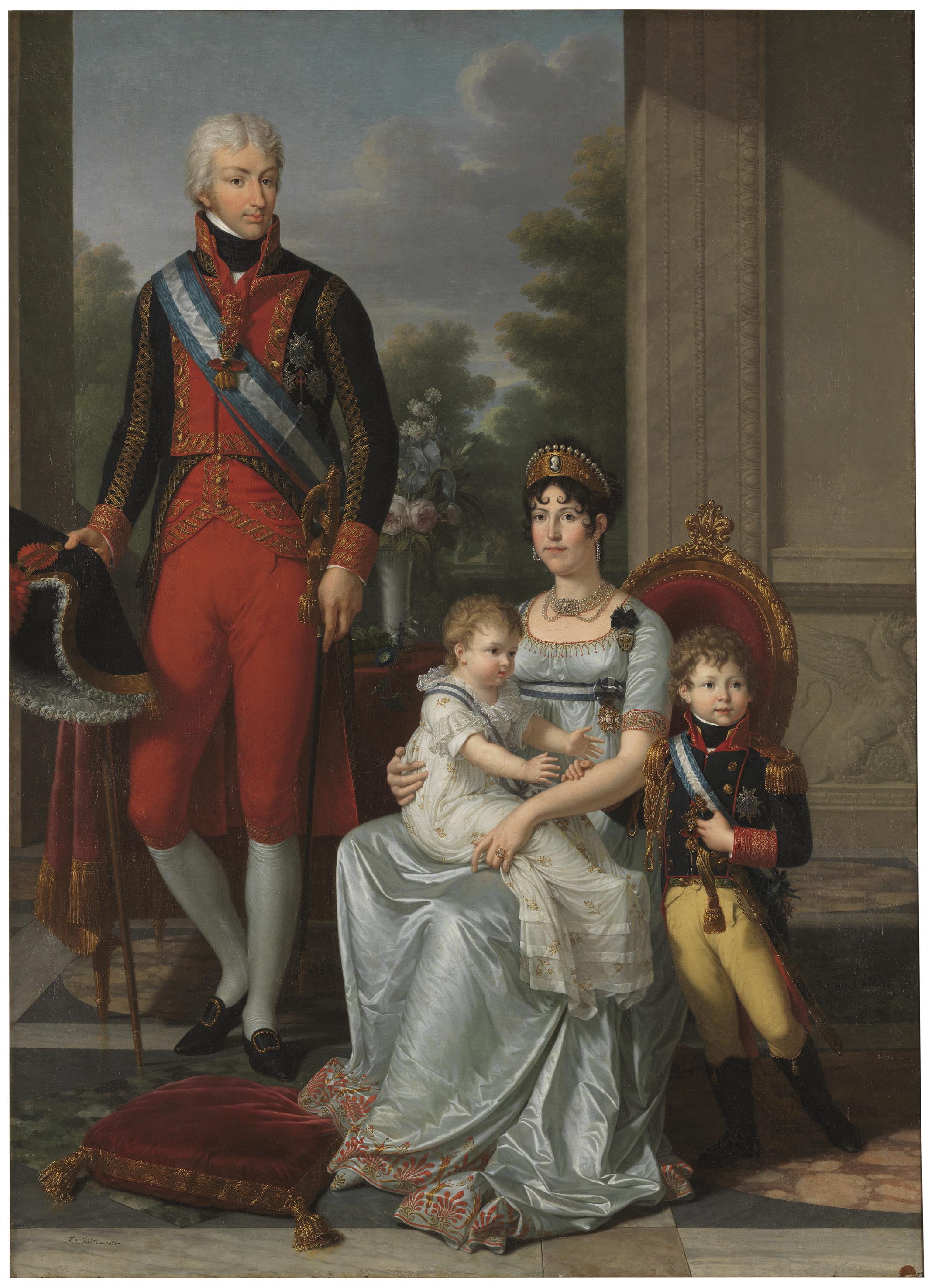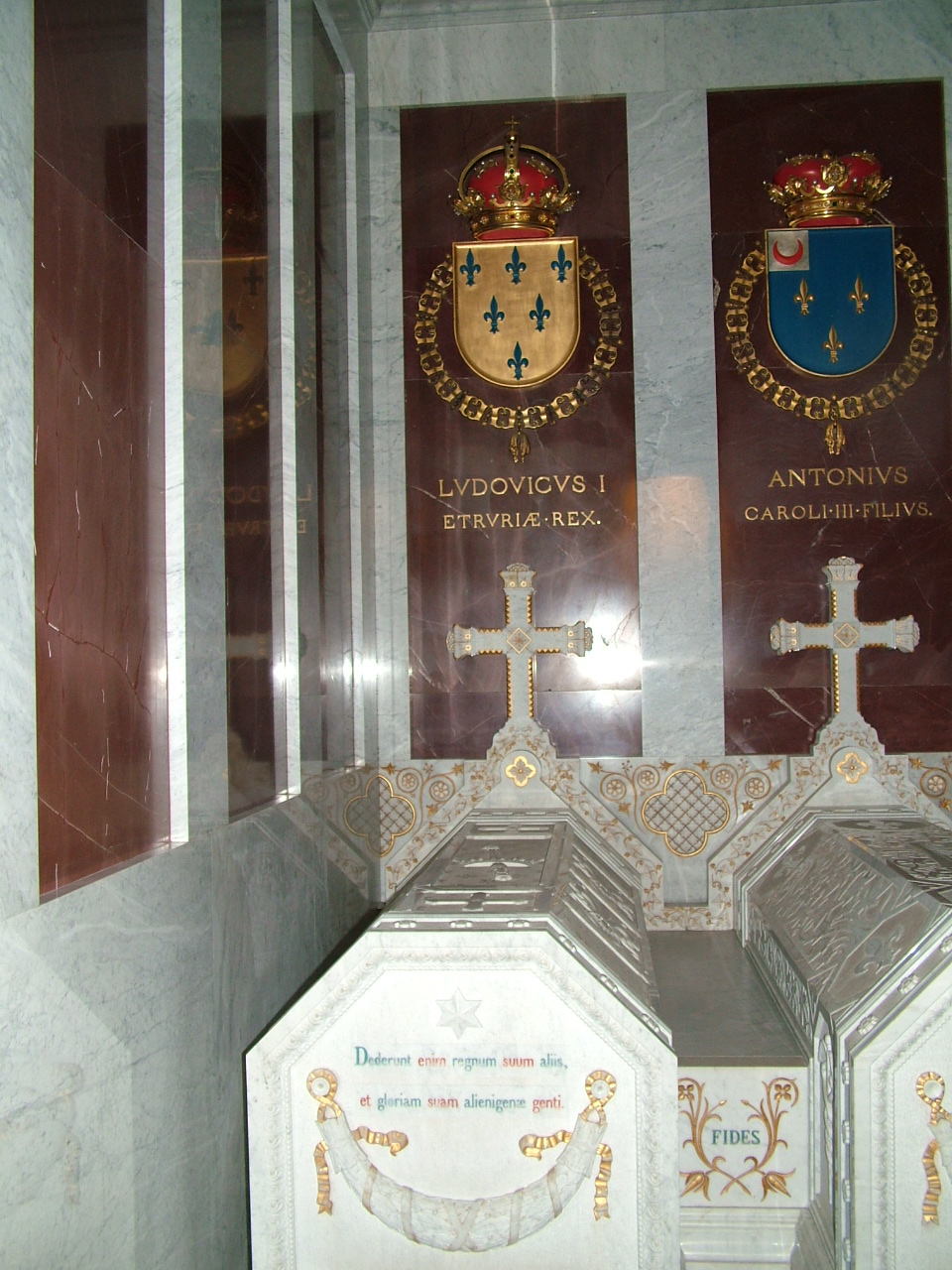Louis, King Of Etruria on:
[Wikipedia]
[Google]
[Amazon]
Louis I (; 5 July 1773 – 27 May 1803) was the first of the two kings of Etruria. Louis was the son of Ferdinand, Duke of Parma, and Maria Amalia of Austria. He was born in 1773, when his great-grandfather, King
 While Louis was staying in Spain, the Duchy of Parma had been occupied by French troops in 1796.
While Louis was staying in Spain, the Duchy of Parma had been occupied by French troops in 1796. 
Louis XV
Louis XV (15 February 1710 – 10 May 1774), known as Louis the Beloved (), was King of France from 1 September 1715 until his death in 1774. He succeeded his great-grandfather Louis XIV at the age of five. Until he reached maturity (then defi ...
of France, was still alive.
Early life
Louis Francis Philibert () was the second child and eldest son of Ferdinand, Duke of Parma, a grandson of French King Louis XV and Marie Leczinska, and his wife Archduchess Maria Amalia of Austria. Louis and his older sister Carolina were the favorites of their parents. They were personally instructed in religion by their father, despite the fact that their younger children was actually more interested in the subject than they were. In 1778, he hit his head on a marble table while playing with Carolina, and afterward suffered from epilepsy.Justin C. Vovk: In Destiny's Hands: Five Tragic Rulers, Children of Maria Theresa (2010)Marriage and issue
In 1795, Louis came to the Spanish court to finish his education and also to marry one of the daughters of KingCharles IV of Spain
Charles IV (; 11 November 1748 – 20 January 1819) was King of Spain and ruler of the Spanish Empire from 1788 to 1808.
The Spain inherited by Charles IV gave few indications of instability, but during his reign, Spain entered a series of disa ...
, who were his first cousins. He was to marry Infanta Maria Amalia or Infanta Maria Luisa, and chose the latter, who was somewhat more attractive and cheerful than the melancholy Maria Amalia. On 25 August 1795, he married Maria Luisa at Madrid
Madrid ( ; ) is the capital and List of largest cities in Spain, most populous municipality of Spain. It has almost 3.5 million inhabitants and a Madrid metropolitan area, metropolitan area population of approximately 7 million. It i ...
and was made an Infante
Infante (, ; f. ''infanta''), also anglicised as "infant" or translated as "prince", is the title and rank given in the Iberian kingdoms of Spain (including the predecessor kingdoms of Aragon, Castile, Navarre, and León) and Portugal to the ...
of Spain
Spain, or the Kingdom of Spain, is a country in Southern Europe, Southern and Western Europe with territories in North Africa. Featuring the Punta de Tarifa, southernmost point of continental Europe, it is the largest country in Southern Eur ...
.
The marriage between the two different personalities turned out to be happy, though it was clouded by Louis's ill health. He was frail, suffered chest problems, and since a childhood accident when he hit his head on a marble table, suffered from symptoms that have been identified as epileptic fits. As the years went on, his health deteriorated, and he grew to be increasingly dependent on his wife. The young couple remained in Spain during the early years of their marriage.
The couple had two children:
* Charles Louis Ferdinand (1799–1883)
* Maria Luisa Carlota, Hereditary Princess of Saxony (1802–1857), married to Hereditary Prince Maximilian of Saxony, widower of her aunt Caroline, as his second wife and remained childless.
Swap of Parma and Etruria
 While Louis was staying in Spain, the Duchy of Parma had been occupied by French troops in 1796.
While Louis was staying in Spain, the Duchy of Parma had been occupied by French troops in 1796. Napoleon Bonaparte
Napoleon Bonaparte (born Napoleone di Buonaparte; 15 August 1769 – 5 May 1821), later known by his regnal name Napoleon I, was a French general and statesman who rose to prominence during the French Revolution and led Military career ...
, who had conquered most of Italy and wanted to gain Spain as an ally against Britain, proposed to compensate the House of Bourbon
The House of Bourbon (, also ; ) is a dynasty that originated in the Kingdom of France as a branch of the Capetian dynasty, the royal House of France. Bourbon kings first ruled France and Kingdom of Navarre, Navarre in the 16th century. A br ...
for their loss of the Duchy of Parma with the Kingdom of Etruria, a new state that he created from the Grand Duchy of Tuscany
The Grand Duchy of Tuscany (; ) was an Italian monarchy located in Central Italy that existed, with interruptions, from 1569 to 1860, replacing the Republic of Florence. The grand duchy's capital was Florence. In the 19th century the population ...
. This was agreed upon in the Treaty of Aranjuez.
Louis had to receive his investiture from Napoleon in Paris, before taking possession of Etruria. Louis, his wife and his son travelled incognito through France under the name of the Count of Livorno. Having been invested in Paris as King of Etruria, Louis and his family arrived in August 1801 at his new capital, Florence.
In 1802, both Louis and his pregnant wife travelled to Spain to attend the double-wedding of Maria Luisa's brother Ferdinand
Ferdinand is a Germanic name composed of the elements "journey, travel", Proto-Germanic , abstract noun from root "to fare, travel" (PIE , "to lead, pass over"), and "courage" or "ready, prepared" related to Old High German "to risk, ventu ...
and her youngest sister Maria Isabel. Offshore at Barcelona, Maria Luisa gave birth to their daughter, Marie Louise Charlotte. The couple returned in December of that year, after having been notified of the death of Louis's father.
Back in Etruria, Louis's health worsened, and in May 1803, he died at the age of twenty-nine, possibly due to an epileptic crisis. He was succeeded by his son, Charles Louis, as King Louis II of Etruria, under the regency of his mother, Maria Luisa.

Ancestry
References
External links
* {{DEFAULTSORT:Etruria, Louis 1 Louis 1 1773 births 1803 deaths Louis of Etruria Louis of Etruria Louis of Etruria Louis of Etruria Knights of the Golden Fleece of Spain Burials in the Pantheon of Infantes at El Escorial 1800s in the Grand Duchy of Tuscany 19th-century Italian people 19th century in the Grand Duchy of Tuscany 19th-century monarchs in Europe